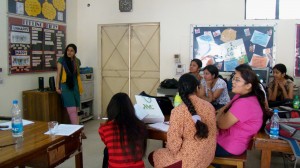The DC Women’s Theater group put together an amazing showcase of monologues for the very last event of International Anti-Street Harassment Week. Here are six of the monologues. They’re each about two minutes and they’re all very powerful.
Archives for March 2012
“Bring Your Brother Day” workshop on street harassment
 (Editor’s Note: This guest blog post was written by Nefertiti Martin, Community Organizer and Katie Bowers, MSW intern at Girls for Gender Equity.)
(Editor’s Note: This guest blog post was written by Nefertiti Martin, Community Organizer and Katie Bowers, MSW intern at Girls for Gender Equity.)
On March 16, youth organizers at Girls for Gender Equity (GGE), a small nonprofit organization in Brooklyn, New York, that addresses the issue of street harassment, invited male friends and family members to a “Bring Your Brother Day” workshop about gender equity and stopping street harassment. “Bring Your Brother Day” was a day of conversation, connection and consciousness-raising in a fun and safe space.
 The young women of GGE felt strongly about the importance of bringing the young men in their lives into their work to counteract sexual harassment and gender-based violence. The workshop grew out of youth organizers’ concerns that the conversation around street harassment and gender-based violence is taking place primarily among women. By reaching out to the young men in their lives, youth organizers are working to build allies and strengthen GGE’s work in promoting gender equity.
The young women of GGE felt strongly about the importance of bringing the young men in their lives into their work to counteract sexual harassment and gender-based violence. The workshop grew out of youth organizers’ concerns that the conversation around street harassment and gender-based violence is taking place primarily among women. By reaching out to the young men in their lives, youth organizers are working to build allies and strengthen GGE’s work in promoting gender equity.
GGE’s youth organizers led activities throughout the three-hour workshop that explored what gender stereotypes are, how they impact the lives of young people and how young men can be allies to young women. The young men were thoughtful, open and engaged throughout the workshop. Their comments and opinions added new depth to the conversation and reflected the positive influence of the awesome young women in their lives.
 The event was hosted in conjunction with International Anti-Street Harassment Week. GGE youth organizers and their brothers attended the Anti-Street Harassment Week Rally at the Judson Memorial Church in New York City on Saturday, March 24th.
The event was hosted in conjunction with International Anti-Street Harassment Week. GGE youth organizers and their brothers attended the Anti-Street Harassment Week Rally at the Judson Memorial Church in New York City on Saturday, March 24th.
The young women felt very proud of the workshop and their contribution to Anti-Street Harassment Week and the movement to end gender-based violence. GGE looks forward to participating in Anti-Street Harassment Week next year!
Safety Audit Walk in Montreal for Anti-Street Harassment Week
(Editor’s Note: This is cross-posted with permission from the blog of Women in Cities International, based in Montreal, Canada.)
From March 18th to 24th, 2012, we celebrated the second edition of International Anti-Street Harassment week….As one of the (many!) co-sponsors of this great event, Women in Cities International partnered with radio station CKUT and the 2110 Gender Advocacy Center, two Montreal-based organizations also working on special programming for Women and Girls, to organize an introductory Women’s Safety Audit walk (WSA).
For our purpose, this WSA was meant to introduce participants to its methodology, while sensitizing them to women’s security and inclusion (or lack thereof) in public space. We did this by analyzing various factors of our urban environment and how they affect how each of us participates in city life. Such factors may include built infrastructure (lighting, sidewalk width, etc.) as well as user characteristics or behaviors, including women to men ratio and…. street harassment!
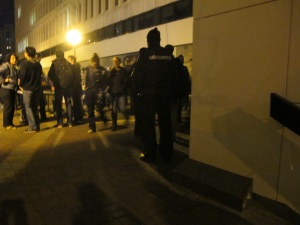 A group of seven women took part in the WSA, around the downtown Concordia Campus area in Montreal, starting from the 2110 Gender Advocacy Center McKay office, walked along to Bishop street via an alley way, down to de Maisonneuve and back. Participants were asked to pay attention to lighting, maintenance, accessibility of sidewalks and buildings, the absence of greenery or parks, or just opportunities to linger. Perfectly in tone with the theme of out activity, a group of male students drinking on the Reggies pub terrace, overlooking the alley we were auditing, tried to get our attention in a not so subtle way… A group of women walking through an alley appears to be cause for attention.
A group of seven women took part in the WSA, around the downtown Concordia Campus area in Montreal, starting from the 2110 Gender Advocacy Center McKay office, walked along to Bishop street via an alley way, down to de Maisonneuve and back. Participants were asked to pay attention to lighting, maintenance, accessibility of sidewalks and buildings, the absence of greenery or parks, or just opportunities to linger. Perfectly in tone with the theme of out activity, a group of male students drinking on the Reggies pub terrace, overlooking the alley we were auditing, tried to get our attention in a not so subtle way… A group of women walking through an alley appears to be cause for attention.
It also happens that downtown Montreal is currently the stage for daily manifestations by disgruntled students calling on the government to cancel the planned hikes of education fees. On March 20th, students had blocked off part of de Maisonneuve with couches, were playing music, showcasing their message through banners and slogans. This new, albeit temporary use of the street, drew attention to how the re-appropriation of public space by citizens can be a powerful tool not only as a pressure tactic (as it was here), but as a way to make it safer and more inclusive, on the condition that the measures used attract a greater diversity of users.
As we ended our WSA, participants asked us if we could organize another such walk on a Saturday on Crescent street at 3:00 am, when folks leave the bars and clubs and the famed Montreal street can become a very uncomfortable place for many women. Reminding us once more how street harassment is a big problem, in every city, no matter how safe, and that we need to keep calling it out and denouncing it as unacceptable.
Discussions, rallies, photography competitions: Anti-Street Harassment Week in Delhi, India
(Editor’s Note: This guest blog post was written by the Safe Delhi Campaign Team to recap their efforts during International Anti-Street Harassment Week in Delhi, India)
CONTEXT:
 Delhi has changed a lot in the past decade. Skyscrapers, flyovers, shopping complexes rapidly covered the city making it for a particular section of the society. But, a general animosity and a sense of belongingness lacks in the city. Equal participation in the city and the right to ownership is not guaranteed for women. The sense of enjoyment, of loitering and of using public places in the way they desire are very limited and at times non- existent. Their presence in this ‘urban city’ has to be constantly negotiated and compromised. The fear of and the incidence of being sexually harassed in public spaces have unfortunately become a part a woman’s experience in the city.
Delhi has changed a lot in the past decade. Skyscrapers, flyovers, shopping complexes rapidly covered the city making it for a particular section of the society. But, a general animosity and a sense of belongingness lacks in the city. Equal participation in the city and the right to ownership is not guaranteed for women. The sense of enjoyment, of loitering and of using public places in the way they desire are very limited and at times non- existent. Their presence in this ‘urban city’ has to be constantly negotiated and compromised. The fear of and the incidence of being sexually harassed in public spaces have unfortunately become a part a woman’s experience in the city.
Women’s access to safe and violence free public spaces is her right. Sexual harassment in public spaces restricts choices and opportunities for women in education, livelihood, health and decision making. The gendered nature of public spaces not only denies their access but also ‘legitimizes’ the invisibility of women after a particular hour of the day. It is the right of every citizen to enjoy public spaces irrespective of gender, caste, class, sexuality, disability or any other social identity. The responsibility of society to ensure equal rights for all has to increase. Safety and right to the city can be guaranteed with a more sensitive and effective service delivery for all the citizens. It is time to understand and address factors of safety and make the city accessible and inclusive for all.
Global Week on Anti Sexual Harassment and Safe Delhi Campaign:

100 co-sponsors across the world have joined hands to mark the International Anti-Street Harassment Week, a program of Stop Street Harassment . A core team of activists led by Holly Kearl volunteered their time to make the campaign possible. Last year, the first Anti Street Sexual Harassment Day was celebrated in Delhi and saw the largest turn out worldwide. The march coordinated by Safe Delhi Campaign and a group of students from University of Delhi, saw participation from students, faculty and police constables. This year the plan has been expanded for a week.
Safe Delhi Campaign co-sponsoring the event in India called for action from different partners across the city -from individuals, to organizations to media houses. The intent was to involve people from different walks of life to talk about the issue and address it in their own way.
Objective of the Campaign:
- To initiate dialogues and discussions among students in different colleges and universities on safety in public spaces.
- To spread awareness on factors of safety through advocacy materials of the campaign.
- To initiate and moderate discussions on social media platforms on safety in public spaces and right to the city.
Dialogue with Students: ‘Let’s Reclaim Public Spaces’
The first day of The Global Anti Street Harassment Week 2012 was marked by an extensive discussion on gendering of public spaces with students from the Department of Human Development of Institute of Home Economics. Students shared their personal experiences of ‘gender’ as an identity that impacts their choices and opportunities to live equally in the city. The students deliberated on gaps in emergency helpline numbers for women.
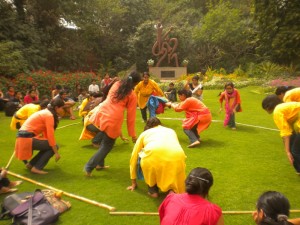 Service provisions like public toilets or well lit parks to also talking about the role of larger society to create an enabling environment for all. With the remark that safety is a woman’s right to the city, the students undertook a ‘class to class campaign’, sharing with students the message against sexual harassment on streets and also sharing some.
Service provisions like public toilets or well lit parks to also talking about the role of larger society to create an enabling environment for all. With the remark that safety is a woman’s right to the city, the students undertook a ‘class to class campaign’, sharing with students the message against sexual harassment on streets and also sharing some.
An open lawn discussion at Lady Sri Ram College for Women on ‘Reclaiming Right to Public Spaces’ was called by students from National Service Scheme on Tuesday, the 20th of March, 2012. There was an interesting discussion on the factors that attribute a place as being safe and unsafe. A street play by the college theatre society marked the beginning of the discussion. The students were shared helpline booklets, poster and other relevant material after the discussion. More than 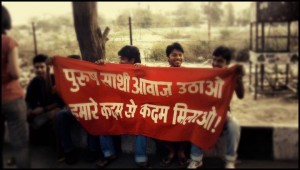 100 students participated in the discussion.
100 students participated in the discussion.
Let’s Make Delhi Safe for Women! Reclaiming Right to Public Spaces:
The recent weeks in the National Capital Territory of Delhi has seen an sudden increase of reported sexual assaults on women, mostly while their presence in public spaces. Following such incidences were remarks given to women to not work after 8 p.m. or to not wear “revealing clothes.”
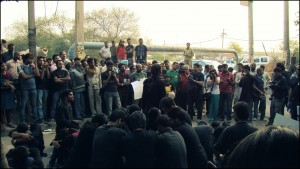 The blame of these and many more incidences was left on the woman. This led to agitation not just among the civil society group of the city but also individual masses. Everybody across the city decided to stand against violence on women and say no to unsafe public spaces.
The blame of these and many more incidences was left on the woman. This led to agitation not just among the civil society group of the city but also individual masses. Everybody across the city decided to stand against violence on women and say no to unsafe public spaces.
The first public protest was called in Gurgaon as a response to the incident that took place outside one of the malls in the area following which remarks by police representatives on girls should stay home after 8:00 pm was called for. The protest was joined by women’s groups, youth organisations, individuals from the city and several media houses as well. 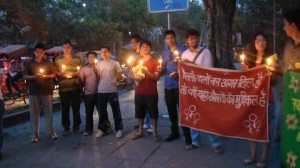 Following the first protest, a Citizen Charter of Demands was drafted and a petition to state agencies to implement the same was circulated all across. Social networking pages to public campaigns to meeting individuals where ever possible, the petition was taken all across the city.
Following the first protest, a Citizen Charter of Demands was drafted and a petition to state agencies to implement the same was circulated all across. Social networking pages to public campaigns to meeting individuals where ever possible, the petition was taken all across the city.
The city saw a series of public protests in different places and through different forms. To mark the end of the Global Week, the students from the University of Delhi called for a candle light vigil to “Reclaim your Right to Safe and Violence free City for Women.” The vigil was held on March 24, 2012, in the evening and was participated by residents of the area, students, individuals from the city asking for a right to safe public spaces. An appeal to more men to join

and for police support was constantly being made during the protest and that actually led to more people joining in the middle of the protest. More than 100 hundred people signed the petition and participated in the march.
CAMPAIGNING ONLINE
Photography Competition on Right to A Safe And Inclusive City
An online photography competition in solidarity with the Global week was hosted on the Safe Delhi Campaign Facebook page. The competition was well received and saw multiple entries. A panel of judges was formed to choose the winning photograph. Discussion around factors to make city safe was also initiated online.
Street theater about street harassment by The Saartjie Project
(Editor’s Note: This is cross-posted with permission from The Saartjie Project (TSP) Tumblr page. The article is written by @JessSolomon, the founding producer. TSP wrote and performed street theater about street harassment in Washington, DC, for International Anti-Street Harassment Week.)
We are a home-grown performance ensemble made up of black women exploring and creating at the intersections of race, gender and power, intentionally and without apology. We create in community and perform on stages, at universities, in multi-purpose rooms, galleries and now …the street. We fiercely believe in the power of our narratives and those of our allies, so to co-sponsor Washington DC’s Anti-Street Harassment Week was a no-brainer (I give thanks for @mdotwrites exposing me to texts like Dr. Bernice Johnson’s Working in Coalition – it grounds me in the importance of this kind of work). It was deciding what we’d do as a co-sponsor that was the challenge.
After much discussion and sisterly debate about “what” we’d do, we decided to perform somewhere we’ve known Street Harassment to take place. There is power in reclamation of spaces.
We crowdsourced a performance location and Gallery Place/ Chinatown – one of the busiest areas in the District – won hands down. (Adams Morgan and Georgetown were close contenders.)
Process
As allies and supporters, it’s important that you understand the context of this “performance”. (Please note: I use that term loosely. Sometimes “performance” conjures up fancy notions like curtains and lights and seats and backstage.) At its essence, our performance was an output of a personal process. We sat around and asked ourselves, “Why are we doing this? Who are we doing this for? What does a world without Street Harassment look like? Feel like?” We talked about feeling safe enough to perform. “What if someone approached us? Touched us? What did we want spectators to walk away with? What would their call to action be?”
Holding Space
We are still so grateful to the people who intentionally showed up on a rainy Saturday afternoon to witness and hold space for us on the street. Supporters who marked it in their calendar and invited their friends. We are still so grateful for those that weren’t there but were thinking about us. We are also still so grateful for those who had no idea that they’d become an important part of some bold magic happening on the street.
Some Reflections from the Saartjie Crew
Shonda said, “… people stopped and shared their stories. Young women seemed to appreciate that we were speaking about our lives in public. And young men felt comfortable enough to jump in and assist! I appreciated all of the people who included themselves even if that just meant bearing witness.”
Saartjie Project members experienced street harassment directly after our performance. Yup.
As Farah recounted, “A man who observed our show twice walked up to me and Shonda to share what we initially thought to be feedback about our performance. Instead, he told us that we didn’t have to dress like nuns and that people might be more attentive if we showed a little breast and thigh. I felt anger rising up in me, but said “God bless you. And I pray that one day, you won’t street harass women how you’re harassing us” and walked away from him. The man continued to ramble and followed us until I made a scene and asked him to say the same thing to my husband who happened to be volunteering.
I questioned if the performance was effective—a man who looked engaged still doing exactly what we had been speaking against – to us directly! But I weighed his ignorance with the positive responses we received—those from a young man who helped us pass out brochures about Street Harassment and confessed that he’s been guilty of harassing women; an older woman who said that she’s still a victim of street harassment; and the teenage girls who nodded and said that they too have experienced street harassment. I knew that I couldn’t let one person affect the importance of what we did. We started conversations and used art to address a social issue that was proven to not only be relevant and current, but personal.”
So now…
Anti-Street Harassment Week is over but our work isn’t. This experience/experiment taught us that we must continue to tell our stories, recognize the responsibility in being a bystander and that in the midst of fighting for justice someone who you think is a supporter may not be. And that teaching moments show up all the time…even when you’re performing on the street.
Next year, I envision performances like ours happening simultaneously all over the District, perhaps all over the planet! Imagine how powerful that would be.
One last thing…
Some readers may be wondering about the origin of our name.
Saartjie Baartman was a South African woman taken from her homeland under false pretenses and crudely displayed in Europe from 1810 – 1815. She was given the show name “Hottentot Venus”, locked in a cage for 11 hours a day, dressed in feathers and sheer clothing to “enhance” her pronounced buttocks and labeled as hypersexual and subhuman. Her silhouette became in inspiration for the Victorian bustle worn by women of that time. Upon her death her body was dissected and publicly displayed in a museum in Paris until 1974. After much international political and social discourse over where Saartjie Baartman “belonged,” her remains were flown back to her homeland in May 2002, and laid to rest almost 200 years after she was taken to Europe. Our work revolves about bringing humanity to her life and the many paradoxes and crooked rooms we live in as black women.

